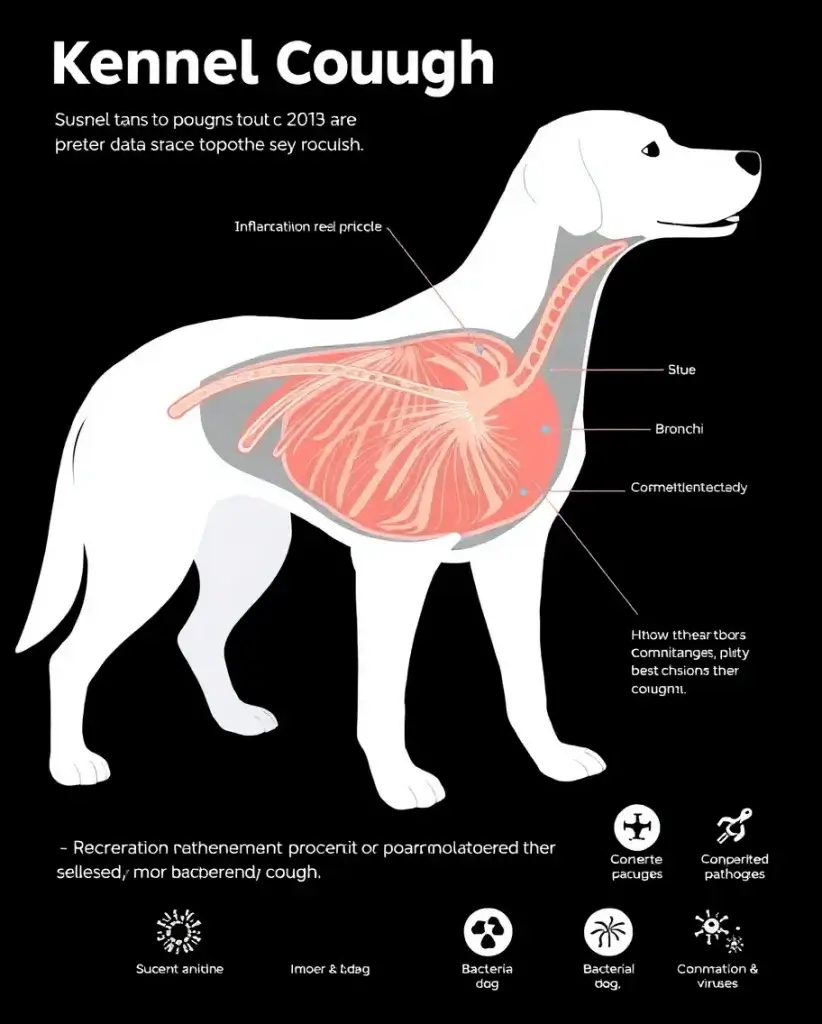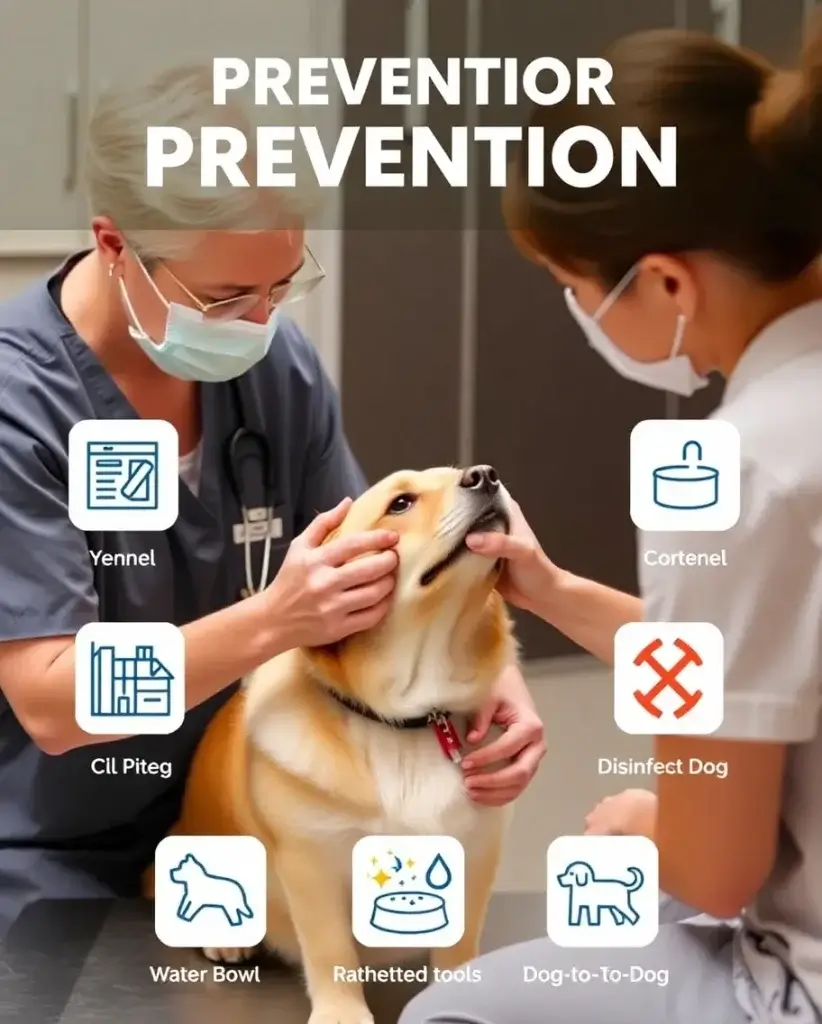Kennel cough, also known as canine infectious tracheobronchitis, is a common and highly contagious respiratory disease in dogs. While it might sound alarming, it’s usually treatable with the right approach. This article will guide you through everything you need to know about kennel cough, from recognizing the symptoms to treating and preventing it effectively.
What Is Kennel Cough?

Kennel cough is a complex respiratory condition in dogs caused by various bacteria and viruses, most notably the Bordetella bronchiseptica bacterium. It’s similar to the common cold in humans and is highly contagious, particularly in environments where many dogs congregate, like kennels, dog parks, and grooming salons.
Understanding the Causes of Kennel Cough
The primary cause of kennel cough is the Bordetella bacterium, but the disease can also be triggered or exacerbated by viruses like the parainfluenza virus, adenovirus, and canine influenza virus. These pathogens attack the respiratory system, leading to inflammation and irritation of the trachea and bronchi.
How Kennel Cough Spreads
Kennel cough spreads through airborne droplets, direct contact with infected dogs, or contact with contaminated surfaces like water bowls or toys. The contagious nature of kennel cough makes it essential to recognize the symptoms early and take action to prevent further spread.
Recognizing the Symptoms of Kennel Cough

Identifying the symptoms of kennel cough early is crucial for timely treatment. While the severity of symptoms can vary depending on the dog’s health, age, and vaccination status, there are some common signs to watch out for.
Common Symptoms of Kennel Cough
- Persistent Dry Cough: The most noticeable symptom is a dry, hacking cough that often sounds like a goose honk. This cough can be triggered by excitement, exercise, or pressure on the trachea, such as pulling on a collar.
- Retching and Gagging: Dogs with kennel cough may retch or gag as if trying to clear their throat. This is often mistaken for vomiting.
- Nasal Discharge: A runny nose with clear or slightly cloudy discharge may accompany the cough.
- Sneezing and Eye Discharge: Mild sneezing and watery eyes are also common, though less frequent than coughing.
- Lethargy: Affected dogs might be less energetic than usual, though severe fatigue is uncommon in mild cases.
- Loss of Appetite: While not always present, some dogs may eat less due to discomfort.
- Fever: In more severe cases, dogs can develop a low-grade fever, signaling a need for veterinary attention.
Differentiating Kennel Cough from Other Respiratory Issues
While kennel cough is common, its symptoms can be similar to other respiratory conditions, such as canine influenza, bronchitis, or heart disease. A professional diagnosis is crucial if symptoms persist or worsen, as these conditions require different treatments.
Diagnosing Kennel Cough
Diagnosing kennel cough typically involves a combination of physical examination, medical history, and sometimes additional tests to rule out other illnesses.
Veterinary Examination
During a veterinary visit, the vet will listen to your dog’s cough and check for any signs of nasal discharge, fever, or other symptoms. Usually, a diagnosis can be made based on clinical signs alone.
Diagnostic Tests
- Chest X-rays: A chest X-ray may be performed to assess lung health in cases where pneumonia or other complications are suspected.
- Blood Tests: Blood tests might be ordered to check for infection or inflammation in severe cases.
- Tracheal Wash: In rare cases, a tracheal wash (collecting fluid from the trachea) may be conducted to identify the specific bacteria or viruses involved.
How to Treat Kennel Cough
Treating kennel cough depends on the severity of the symptoms and the overall health of the dog. Mild cases often resolve on their own, but treatment can speed up recovery and prevent complications.
At-Home Care for Kennel Cough
For mild cases, home care can be sufficient to help your dog recover.
Rest and Hydration
Ensure your dog gets plenty of rest and stays hydrated. Restrict activities that could aggravate the cough, such as vigorous exercise or playing with other dogs.
Humidifier Use
Using a humidifier or taking your dog into a steamy bathroom can help soothe their irritated airways. This can make breathing easier and reduce coughing fits.
Nutritional Support
Provide a balanced diet to support your dog’s immune system. In some cases, softer foods may be necessary if your dog’s throat is sore from coughing.
Medications for Kennel Cough
If your dog’s symptoms are more severe, your vet may prescribe medications to help manage the condition.
Antibiotics
Antibiotics like doxycycline or amoxicillin may be prescribed if a bacterial infection is confirmed or suspected. These help combat the Bordetella bacteria that often cause kennel cough.
Cough Suppressants
Cough suppressants like hydrocodone or butorphanol can be prescribed to reduce the frequency and severity of coughing, providing your dog with some relief, especially at night.
Anti-inflammatory Medications
Anti-inflammatory drugs may be used to reduce throat and airway inflammation, making your dog more comfortable.
When to Seek Emergency Care
While kennel cough is usually mild, complications like pneumonia can occur, especially in puppies, older dogs, or those with weakened immune systems. If your dog shows signs of difficulty breathing, persistent high fever, or refuses to eat or drink, seek veterinary care immediately.
Preventing Kennel Cough

Prevention is key to keeping your dog healthy, especially if they are frequently exposed to other dogs. Several strategies can help minimize the risk of kennel cough.
Vaccination
Vaccines for Bordetella bronchiseptica, parainfluenza, and adenovirus are available and can significantly reduce the risk of kennel cough. These vaccines are especially recommended for dogs that are regularly boarded, attend daycare, or participate in dog shows.
Types of Kennel Cough Vaccines
- Intranasal Vaccine: Administered as drops in the nose, providing quick immunity.
- Injectable Vaccine: Given as an injection, often combined with other vaccines.
- Oral Vaccine: A newer option that is administered by mouth.
Hygiene Practices
Regularly clean and disinfect your dog’s living area, bedding, and toys to reduce the risk of infection. If your dog has been in a high-risk environment, consider bathing them to remove any potential pathogens from their coat.
Avoiding High-Risk Environments
Limit your dog’s exposure to crowded dog areas, especially during outbreaks of respiratory illnesses. If your dog is at high risk due to age or health conditions, consider alternatives to boarding, such as in-home pet sitting.
Home Remedies for Kennel Cough

While professional treatment is important, some home remedies can support your dog’s recovery from kennel cough.
Honey for Soothing Throat Irritation
Honey is a natural remedy that can soothe a sore throat and reduce coughing. A small amount of honey can be given directly to your dog or mixed with water or their food.
Coconut Oil for Immune Support
Coconut oil has natural antibacterial and antiviral properties. Adding a small amount to your dog’s food can help boost their immune system and fight off the infection.
Herbal Supplements
Herbs like licorice root and marshmallow root can help reduce inflammation and soothe the respiratory tract. These can be given as supplements or brewed into a tea and added to your dog’s water.
Probiotics for Gut Health
A healthy gut can support overall immune function. Probiotics, either through supplements or probiotic-rich foods like yogurt, can help maintain a balanced gut flora during illness.
Frequently Asked Questions About Kennel Cough
What should I do if my dog is exposed to kennel cough?
If your dog has been exposed to kennel cough, monitor them closely for symptoms. Keep them isolated from other dogs and consult your vet for advice. Vaccination may still be beneficial if administered promptly after exposure.
How long does a kennel cough last?
Kennel cough typically lasts between one to three weeks. Mild cases may resolve on their own in a week, while more severe cases can persist longer and may require medical treatment.
Can kennel cough spread to humans?
Kennel cough is primarily a canine disease, but in rare cases, it can spread to humans with weakened immune systems. Good hygiene practices, such as washing hands after handling your dog, can help reduce this risk.
Is kennel cough dangerous for puppies?
Puppies are at a higher risk for complications from kennel cough, such as pneumonia, due to their immature immune systems. Prompt veterinary care is essential for puppies showing symptoms of kennel cough.
Can vaccinated dogs still get kennel cough?
While the vaccine reduces the risk of kennel cough, it’s not 100% effective. Vaccinated dogs can still contract a mild form of the disease, but they are less likely to experience severe symptoms.
How can I prevent my dog from getting kennel cough when boarding?
Ensure your dog is up-to-date on their vaccinations before boarding. Choose a reputable boarding facility with strict hygiene protocols and good ventilation. Consider discussing preventive measures with the facility beforehand.
Conclusion
Kennel cough is a common but manageable condition in dogs. By understanding the symptoms, seeking timely treatment, and taking preventive measures, you can help your dog recover quickly and minimize the risk of future infections. Always consult your vet for personalized advice, especially if your dog’s symptoms persist or worsen. With the right care, your furry friend will be back to their happy, healthy self in no time.
Follow us :


